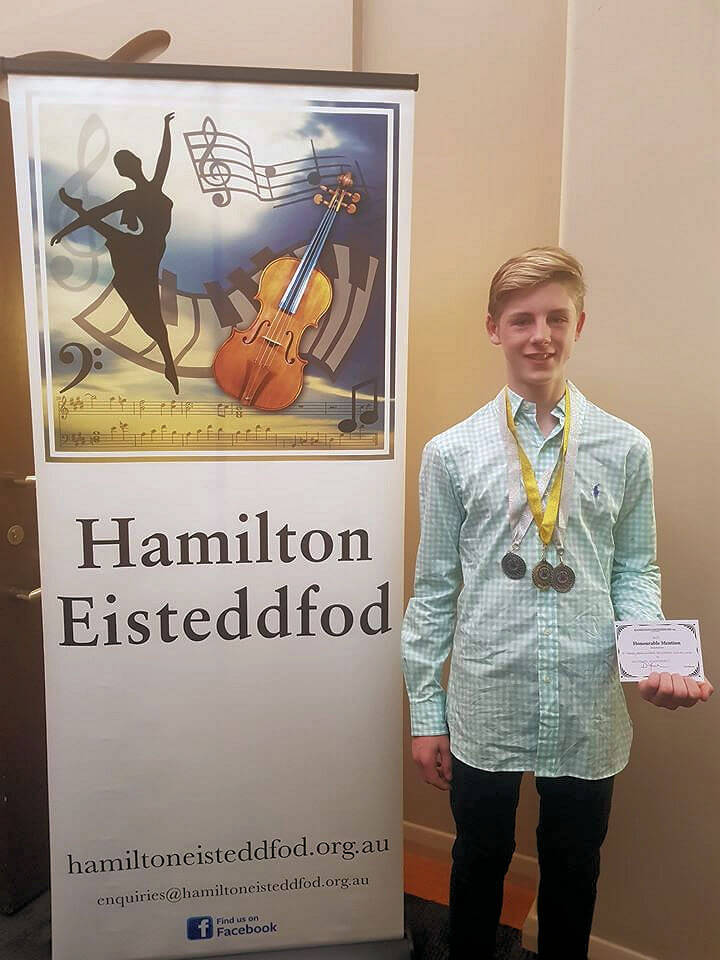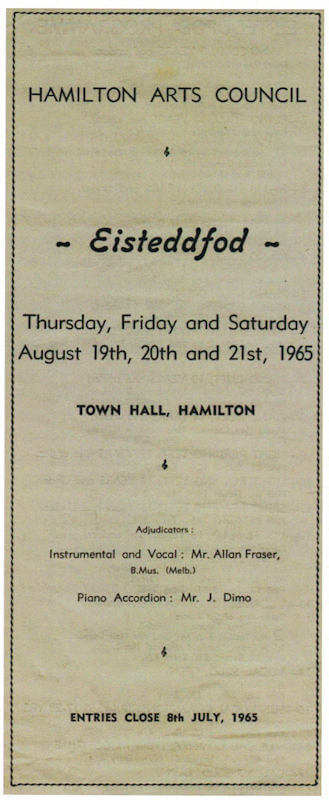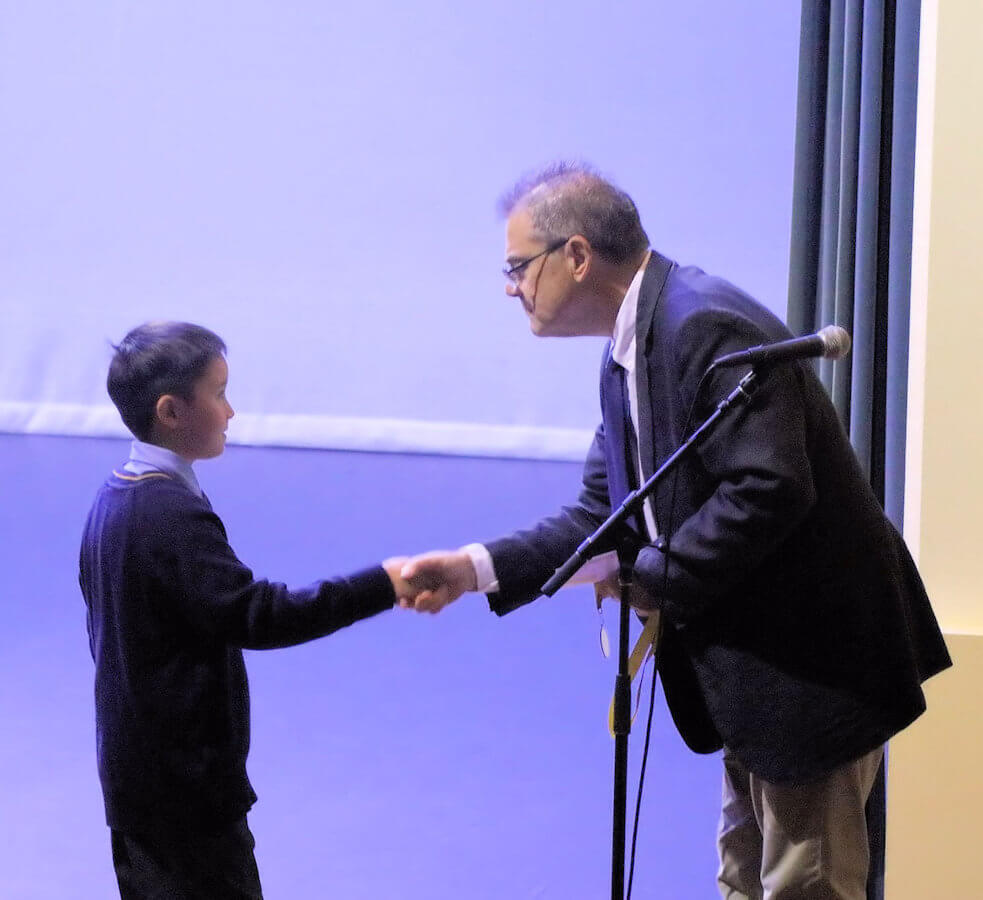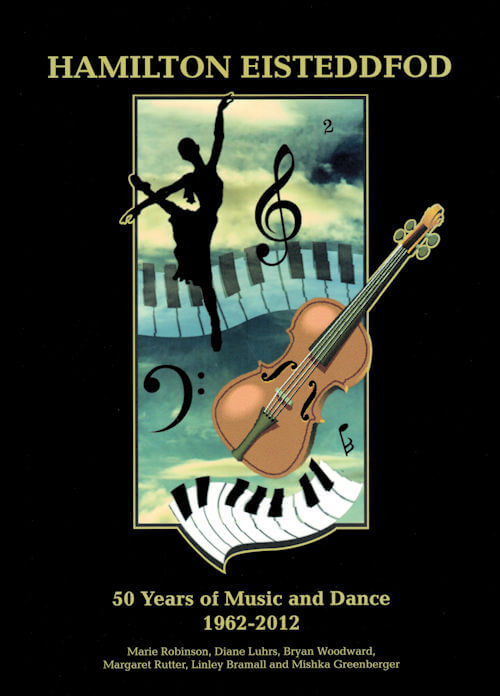About the Eisteddfod
The Hamilton Eisteddfod is one of the longest-running eisteddfods in Victoria and has developed a reputation of excellence.
Each year, the Hamilton Eisteddfod attracts visitors and competitors to Hamilton in Victoria’s Western District, to nurture and celebrate talent and delight in two weeks of performing arts. Visitors travel from throughout regional Victoria, South Australia, Melbourne and interstate to enjoy the experience at the Hamilton Performing Arts Centre.
Competition is divided into approximately 100 Music sections, 80 Dance sections and 20 Speech & Drama sections, and provides opportunities for competitors of primary school age through to adults.
Covering a broad range of genres from classical to popular, the Hamilton Eisteddfod offers a breadth and variety not always seen in regional competitions.

2025 Eisteddfod Snapshot
Music Sections
Dance Sections
Speech & Drama Sections
Competitors (approx)
Trophies Awarded
Prize Money, trophies, medals, awards & scholarships
The Committee
If you are interested in supporting the Hamilton Eisteddfod, there are several ways in which you can become involved. Visit the Support Us page for details.
To get in touch with the committee, find our contact details on the Contact Us page.
2025 Committee Members
President
Leeanne Barber
Vice President
Deborah Jones
Secretary
Denise Fenwick
Asst. Secretary
Jane Van Herpen
Treasurer
Becky Morton
Asst. Treasurer
Glenys Tindall
Program Coordinator
Tara Stephens
Canteen Coordinator
Becky Morton
Committee
Marie Robinson
(Life Member)
Ben Hiscock
Angela Magill
Louise Le Nay
Jody Stephens
Rachel Huf
History of the Hamilton Eisteddfod
1960s
The first annual Hamilton Eisteddfod was run by the Hamilton Arts Council in 1963. The Eisteddfod included 21 sections of piano, vocal, choral and instrumental disciplines. As a sign of interest at the time, dedicated piano accordion sections were also included, attracting competitors from as far as Kerang, Naracoorte, Ararat, Horsham, Geelong, Ballarat and Melbourne.
1970s
In 1971, tap dance and ballet were added to the competition, beginning a long history of dance at the Hamilton Eisteddfod. The number of dance competitors and sections grew quickly in the decade that followed. Electone sections were also introduced in the 1970s (Hamilton is one of the few Eisteddfods in Australia which offers Electone competitions today).
1980s
In 1981, the ‘instrumental’ sections were divided into separate sections for strings, woodwind and brass – an indication of the popularity of orchestral instruments at the time. The Eisteddfod now spanned 8 days of competition, and the number of competitors continued to grow, reaching 980 entries in 1988 (600 of which were ballet entries).
1990s
1991 saw the renovation of the Hamilton Town Hall into the Performing Arts Centre. Now a prominent annual event, the Hamilton Eisteddfod held both the last booking in the Town Hall, and the first in the new PAC. Instrumental groups gained prominence in the 1990s, including Stage Bands, Concert Bands, Orchestras, and Rock Groups.
2000s
The number of sections in the Hamilton Eisteddfod had grown to 193 by the year 2000. This became a decade of innovation for the committee, as they sought new ways to simplify administration of this flourishing event. In 2006, the first Hamilton Eisteddfod website was launched, allowing documents to be distributed online.
2010s
As well as the introduction of contemporary sections such as ‘Animated Movie Vocal Solo’ and ‘Contemporary Guitar’, another modern leap for the Eisteddfod came in the form of the GENI/Stardom online entry system. In 2016, the Committee launched a project to consider ways to future-proof the Eisteddfod. As part of the competition’s growth, 2019 saw the introduction of the first Speech & Drama sections in the Hamilton Eisteddfod.
2020s

A glance at the past: cover of the 1965 Schedule
50-Year Commemorative History
For an in-depth look back on the first fifty years of the Hamilton Eisteddfod, purchase a copy of our commemorative book. Published in 2012 to mark the 50th anniversary of the Hamilton Eisteddfod, this hard-cover book includes dates and milestones, official records and personal reflections.
Hamilton Eisteddfod: 50 Years of Music and Dance 1962-2012
Authors: Marie Robinson, Diane Luhrs, Bryan Woodward, Margaret Rutter, Linley Bramall and Mishka Greenberger.
Publisher: The City of Hamilton Eisteddfod Inc (2012)
ISBN: 978-0-646-57552-0
195 pages
Adjudicators
Every year, the Hamilton Eisteddfod committee seeks adjudicators who will provide expert and informed critiques of performances, at the same time offering encouragement and guidance to competitors.
The Hamilton Eisteddfod is fortunate to attract experienced adjudicators in their fields of music, dance and speech and drama.
Many adjudicators have been nationally or internationally acclaimed musicians and dancers, who bring their valuable experience and guidance to the competition.
Below is a list of past adjudicators for the Hamilton Eisteddfod.

2025 Adjudicators
Music
Alexandra has considerable experience in music education, designing and implementing music programs, running busy Music Departments, coordinating music tours and putting on concerts. Her roles have included Director of Music at The Hamilton and Alexandra College, teaching music at Eltham High School and Head of Music at Wesley College’s Elsternwick Campus.
Dance
Kristie has over 25 years of teaching experience and has owned and operated her own studio for 23 years. Kristie is a fully qualified and registered teacher of the Royal Academy of Dance and currently acts as a mentor, tutor and practical teaching supervisor to the trainee teachers on the RAD’s Classical Ballet Teachers Course.
Speech & Drama
Emma Rudge
Through her job as a secondary teacher of English and VCE Drama and Theatre Studies Emma has been fortunate to mentor students through public speaking competitions. She has been a recipient and participant in the Regional Teachers Mentor Program with the Bell Shakespeare Company in Sydney and has embedded her love of Shakespeare into her teaching.
2024 Adjudicators
Music
Janette is a leading music educator, with a professional career spanning over fifty years. She has been extensively involved in music performance assessment, and has adjudicated at competitions and eisteddfods.
Dance
Debbie trained at The Australian Ballet School in Melbourne, and has also studied in Russia, London, Europe and America. Debbie has mentored for the Royal Academy of Dance (RAD), and trained student teachers to obtain their RAD Teaching Certificate.
Speech & Drama
Louise Le Nay
Louise began her working life as an actor, after graduating from the National Institute of Dramatic Art (NIDA). She worked in theatre, TV and film, and is still recognised for her role as Sandy, the Top Dog on Prisoner. She has worked as a writer and script editor on many TV shows.
2023 Adjudicators
Music
Nadene Gilmore’s music career has spanned performance, teaching, conducting and examination. Nadene has been the Director of Music in several Independent schools in Melbourne. Her expertise in conducting choirs, bands and orchestral ensembles has resulted in much recognition.
Dance
Brian Nolan is one of Australia’s most celebrated dance Adjudicators, and a former member of the Australian Ballet Company. In 2013, Brian was presented with the Phoenix Arts Award for his Contribution to the Arts. He sits on many national and international panels and boards.
Speech & Drama
Louise Le Nay
Louise began her working life as an actor, after graduating from the National Institute of Dramatic Art (NIDA). She worked in theatre, TV and film, and is still recognised for her role as Sandy, the Top Dog on Prisoner. She has worked as a writer and script editor on many TV shows.
2022 Adjudicators
Music
Dr Kenji Fujimura is an internationally-acclaimed pianist and chamber musician, as well as a multi-award-winning composer. His works have been performed throughout Australasia, USA, Romania, Indonesia, Thailand, Singapore and Malaysia.
Dance
Gabrielle commenced her career as a Classical ballet dancer with the WA Ballet Company in the 1980s. In 1992, she established Dance Central, a successful dance studio in Perth.
Gabrielle is now a National Ballet Examiner for the Australian Institute of Classical Dance.
Speech & Drama
Louise Le Nay
Louise began her working life as an actor, after graduating from the National Institute of Dramatic Art (NIDA). She worked in theatre, TV and film, and is still recognised for her role as Sandy, the Top Dog on Prisoner. She has worked as a writer and script editor on many TV shows.
No competition was held in 2021
No competition was held in 2020
2019 Adjudicators
Music
PhD, MA, BA. Member of the World Association for Symphonic Bands and Ensembles, a freelance teacher, university lecturer, composer and conductor.
Dance
Chris Favaloro
Chris guest teaches and adjudicates all over Australia and New Zealand and loves to share his knowledge of dance and the professional industry to aspiring young performers.
Speech & Drama
Doug Van Herpen
Doug brings to this role 35 years’ experience as a secondary school English teacher, including 25 years of teaching year 12 English. Doug was involved in many debates and public speaking events as a participant, coach and adjudicator.
2018 Adjudicators
Music
Prof. Rob McWilliams
Ph.D., M.Mus., B. Mus.Ed Internationally accomplished musician, conductor, and educator. Prof. McWilliams holds a Ph.D. in Music/Music Education from the University of Minnesota. Currently works for Yamaha Music Australia.
Dance
Debbie Landel
Debbie is an experienced adjudicator, having judged many competitions over many years. Debbie trained at the Australian Ballet School and has been a mentor for the Royal Academy of Dance.
2017 Adjudicators
Music
Monte Mumford
Monte holds an international reputation as a conductor, adjudicator and lecturer, contributing regularly to music education through conferences, publications, professional development, and master classes.
Dance
Jillanne Reynolds
Jillanne has been teaching for 39 years, including at Sharon Lawrence Dancers, Dancescapes, Helen Curwood and Kerryn Leanne School of Dance. She began teaching RAD Vocational Graded students at Victorian College of the Arts Secondary School (VCASS) in 2009.
2016 Adjudicators
Music
Peter Bandy
A conductor of considerable experience in genres such as Choral, Orchestral, Opera and Ballet Music. Experienced Music Director, Music Arranger, Chorus Master and Orchestra Manager.
Dance
Donna De Paoli
Donna is a respected choreographer and teacher within the performing arts industry. She is a fully registered teacher with the Royal Academy of Dance since 1986.
2015 Adjudicators
Music
Janis Cook
A respected examiner, adjudicator, lecturer and author.
Dance
Brian Nolan
Grad Dip – Education, Grad Cert – Visual and Performing Arts, B.A, Diploma of ‘Dance’ Australian Ballet School, Royal Academy of Dancing ‘Teachers’ Certificate. Brian’s dance school, The Brian Nolan Academy of Dance is located in Melbourne.
2014 Adjudicators
Music
Peter Hurley
Lecturer in Aural Studies and Topics in Musicology – Music Theatre and Cabaret at the Conservatorium of Music and the VCA at the University of Melbourne.
Dance
Debbie Landel
Debbie trained at the Australian Ballet School, studied in Russia, London, Europe and America and has been a mentor for the Royal Academy of Dance.

